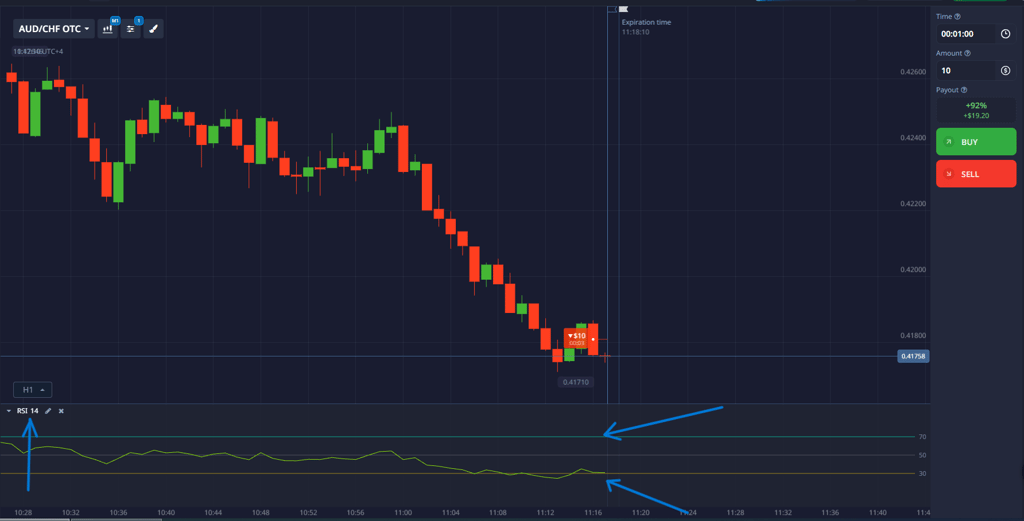RSI Indicator: Complete Guide to Trading Binary Options
The Relative Strength Index (RSI) is one of the most popular technical analysis oscillators, developed by J. Welles Wilder. The indicator measures the speed and change in price movements, helping to identify overbought and oversold market conditions. For binary options traders, RSI is a powerful tool for finding trend reversal points.


What is the RSI indicator and how does it work?
RSI is an oscillator that fluctuates between 0 and 100 and shows the strength of the current price movement. Basic principles of operation:
Scale from 0 to 100: Levels above 70 indicate overbought, below 30 indicate oversold
Rate of change: Measures the rate of price changes over a selected period
Calculation formula: RSI = 100 - (100 / (1 + RS)), where RS = average gain / average loss
Standard period: 14 candles (optimal for most strategies)
A distinctive feature of the indicator is its ability to identify reversal points earlier than the price chart.
Setting up RSI in the trading platform
Recommended settings for binary options:
Period: 14 (standard)
Levels: 30 and 70 (basic oversold/overbought levels)
Additional levels: 20 and 80 for stricter filtering
Color settings:
RSI line: blue or orange
Levels: gray dotted line
Optimal timeframes:
M1-M5: period 14-18
M5-M15: period 10-14
M15-H1: period 8-12
RSI trading signals for binary options
1. Overbought/oversold zones:
Buy (Call): RSI exits the oversold zone (from bottom to top through level 30)
Sell (Put): RSI exits the overbought zone (from top to bottom through level 70)
Expiration: 1-5 minutes
2. RSI divergence with price:
Bullish divergence: Price updates lows, RSI shows rising lows
Bearish divergence: Price updates highs, RSI shows falling highs
Expiration: 2-5 minutes
3. Level 50 as a trend filter:
Upward trend: RSI above 50
Downward trend: RSI below 50
Practical trading strategy
“Rebound from Levels” Strategy:
Wait for the RSI to reach level 30 or 70
Wait for the indicator to reverse
Confirm the signal with a reversal candlestick pattern
Enter the trade in the direction of the reversal
Expiration: 1-5 minutes
Divergence + Level Strategy:
Find divergence between price and RSI
Wait for the key support/resistance level to be tested
Enter the trade when the signal is confirmed
Expiration: 2-5 minutes
Combining with other instruments
To increase the effectiveness of RSI, use it in combination with:
Moving averages (EMA 20/50) - to determine the direction of the trend
Support/resistance levels - to accurately determine entry points
Stochastic - to confirm overbought/oversold signals
MACD - to filter out false signals
Risk management:
Trade size: no more than 2-3% of the deposit
Profit/risk ratio: 1:2
Maximum daily risk: 5%
Conclusion
RSI is a powerful and versatile oscillator that works effectively on various timeframes and trading instruments. Its main advantage is its ability to generate early signals about possible trend reversals. For binary options traders, the ease of interpreting signals and the ability to use RSI both as a standalone tool and in combination with other indicators is particularly valuable.